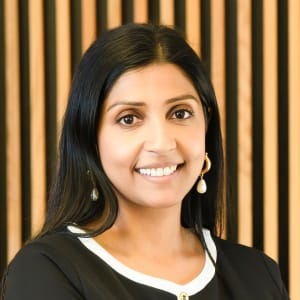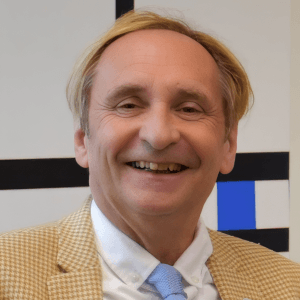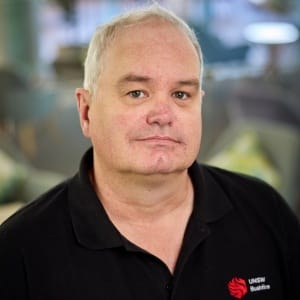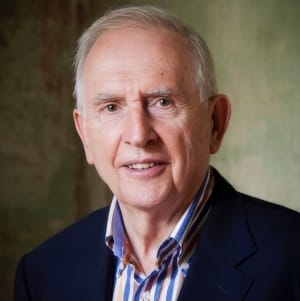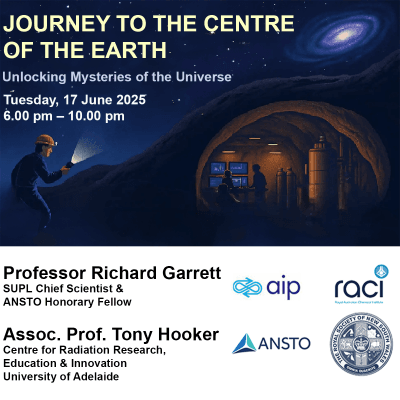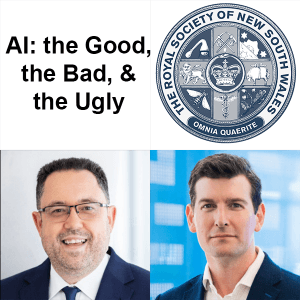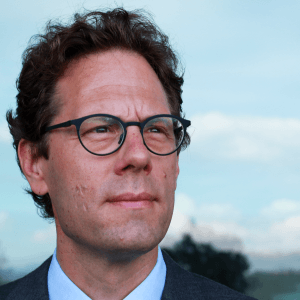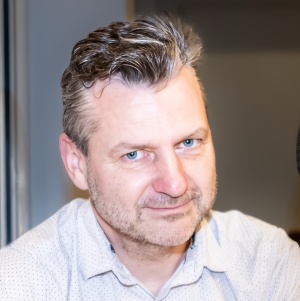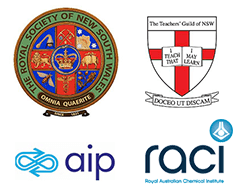
 “Exploring major discoveries and theories in physics, mathematics, biology, and chemistry”
“Exploring major discoveries and theories in physics, mathematics, biology, and chemistry”
The Hon. Alister Henskins SC MP
Prof Johannes Le Coutre FRSN, UNSW Sydney
Prof Benjamin Eggleton FRSN FAA FTSE, University of Sydney
Prof Chris Tisdell FRSN, UNSW Sydney
Prof. Martina Stenzel FRSN FAA, UNSW Sydney
A joint meeting of the Australian Institute of Physics (AIP), the Teachers’ Guild of NSW (TGNSW), the Royal Australian Chemical Institute (RACI), and the Royal Society of NSW.
Date: Friday, 25 March 2022, 5.15 pm for 6.00 pm
Venue: Concord Golf Club, 190 Majors Bay Road, Concord
Ever since the Copernican revolution in the 16th century, science has been progressing at an exponential rate. Major discoveries and theories in physics, mathematics, biology and chemistry have shaped our existence and civilisation, and continue to grow exponentially. The Frontiers of Science forum will present four international experts who will speak on current and upcoming developments in their fields.
Hon Alister Henskens SC MP, NSW Minister for Science, Innovation and Technology, Minister for Skills and Training
Professor Johannes le Coutre FRSN, UNSW (Sydney), School of Chemical Engineering
From Botanists and Butterflies to Populations and Planets
Life Sciences make up for the most stimulating and intellectually challenging endeavours of the 21st century — and there is probably little dispute with this statement. Being the Science of Life, Biology has come a long way. Having started as a purely empirical activity in the pursuit of beauty or even a vis vitalis (living force) early biologists catalogued plants and animals. Throughout several centuries this activity has developed into the dominating branch of all-natural sciences. Biology today is a global high-tech endeavour featuring a wealth of sub-disciplines and research fields with massive involvement of both industry and academia. Moreover, as we have seen in other sciences such as Physics or Chemistry, Biology evolves from a purely investigative science into an area of creative engineering, where the discoveries made are being put into tangible innovation. Interestingly, simple principles of biology, such as competition, collaboration and economy do apply not only to organisms but also to communities, populations and the workings of our entire planet.
Professor Benjamin Eggleton FRSN FAA FTSE, University of Sydney Nano Institute
New Frontiers in Photonics — The Science of Light
Professor Martina Stenzel FRSN FAA, UNSW (Sydney), ARC Laureate Fellow, School of Chemistry
Going small to make big impacts in medicine: nanomedicine
Life Sciences make up for the most stimulating and intellectually challenging endeavours of the 21st One of the challenges in the development of new drugs is the often unfavourable biodistribution: the drug is either quickly cleared from the body, is deactivated or is accumulation in organs where they do rather harm than good. Entrapping drugs into nanoparticles has shown to improve the treatment of many diseases. The first therapeutic nanoparticles that appeared on the market were designed to enhance the treatment of cancer, but more recently nanoparticles helped to vaccinate the world as mRNA vaccines are delivered in these tiny-nano-sized carriers. In this lecture, we will briefly review the nature of various nanoparticles and discuss opportunities and challenges. We will look more in-depth at the nanoparticles already used in FDA approved formation. Finally, I will give an overview of current activities in this field in research labs.
About the presenters
Johannes le Coutre FRSN joined the University of New South Wales (UNSW), Sydney in 2019 as a full Professor of Food and Health. He is responsible for the UNSW Food program and currently, he is developing a broad research agenda on cellular agriculture. Johannes obtained a PhD in Biophysics at the Max Planck Institute of Nutrition Physiology in Germany, where he identified intricate details of the reaction mechanism underlying light-driven bacterial proton transport. With a Human Frontiers award, he went to the Howard Hughes Medical Institute at UCLA to investigate molecular mechanisms of membrane transport. In 2000 he was asked to build a research program on taste physiology at the Nestlé Research Center in Lausanne, Switzerland. His contribution and expertise have been pivotal in making Nestlé work on taste perception and central integration internationally valued and recognized. From 2009 to 2017 le Coutre held a visiting Professorship at the University of Tokyo, where he has been involved with teaching and with a project on taste perception in the Elderly (Mikaku). Professor le Coutre is the founding Field Chief Editor for FRONTIERS in Nutrition, an open-access journal by the Frontiers Media company.
Benjamin J Eggleton is the Director of the University of Sydney Nano Institute (Sydney Nano) and co-Director of the NSW Smart Sensing Network (NSSN). He obtained his PhD degree in Physics from the University of Sydney. In 1996, he joined Bell Laboratories, Lucent Technologies and in 2000 was promoted to Director within the Specialty Photonics Division of Bell Laboratories, focusing on forward-looking research supporting Lucent’s business in optical fibre devices and optical networks. His research deals with photonics at the nanoscale and his group is famous for developing a photonic chip that manipulates light waves at the nanoscale for applications in communications, defence and sensing. Ben is a Fellow of Optical Society of America (OSA), IEEE Photonics, SPIE, the Australian Academy of Technological Sciences and Engineering (ATSE) and the Australian Academy of Science (AAS).
Chris Tisdell is an Honorary Professor of STEM and Digital Education at UQ (Brisbane). His significant and innovative contributions to the student experience have positively impacted millions of people around the world by exploring the challenges of scale, flexibility and personalized learning. For example, he has led Australia’s earliest YouTube channel dedicated to learning mathematics, now in its thirteenth year of operation with more than 15 million views; and has authored free e-textbooks that have a global audience of more than 10 million readers. He is proud to collaborate with key partners within the education industry, ensuring continuous improvement and collaborative advantage therein.
Martina Stenzel FRSN studied chemistry at the University of Bayreuth, Germany, before completing her PhD in 1999 at the Institute of Applied Macromolecular Chemistry, University of Stuttgart, Germany. She started as a postdoctoral fellow at UNSW in 1999 and is now a Scientia Professor in the School of Chemistry at UNSW as well as an ARC Laureate Fellow. Her research interest is focused on the synthesis of functional nanoparticles for drug delivery applications. Her team is working closely with medical researchers and together they develop new nanoparticles to improve the treatment of cancer. She is the editor-in-chief of Materials Horizons and currently serves on a range of editorial boards. She received a range of awards including the 2011 Le Fèvre Memorial Prize of the Australian Academy of Science.

